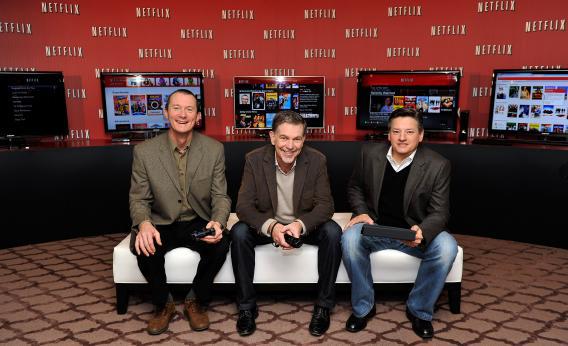My wife and I were watching some of the new Arrested Development episodes last night, and it looks like we and other Netflix subscribers should expect more original programming, as the company says it wants to make investments in original programming as much as 15 percent of its content spending. To understand the game here, you have to understand why so many people were initially skeptical about Netflix’s beloved streaming video service.
The basic problem with Netflix streaming is that it seems to be caught between the folks who own copyrights (movie and TV studios) and the folks who own broadband pipes (cable and telephone companies). Netflix itself jumped out of the gate with a great user-friendly service for longform streaming video and a couple of canny content deals (with Starz, etc.) that made its streaming service popular (I loved it), but in the long run it was hard to see how a pure-play middleman company was going to survive. One great way to do it is to simply stop being a pure-play middleman and start producing original content. And the Netflix bet is that its unequaled access to rich user data about what people actually watch can give it a competitive advantage in the production space.
An interesting contrast here is with HBO. HBO essentially does what Netflix wants to do. It charges subscribers money in exchange for access to a mix of repackaged content and original programming. The only difference is that HBO is structured as an upcharge to your cable package while Netflix is structured as a broadband subscription service. But HBO actually makes a product—HBO Go—that’s broadband streaming of the HBO library. In other words, it’s exactly what Netflix is. But HBO Go exists as a free throw-in for HBO subscribers, while Netflix is a stand-alone product. For a couple of years now there’s been agitation (particularly from geeky cord-cutting Game of Thrones fans) for HBO to offer HBO Go as a stand-alone subscription product just like Netflix. But HBO hasn’t wanted to do this, not so much because it couldn’t make money that way as because it would mess up big-picture-strategy issues for the larger corporation HBO is just one small part of. That’s the innovator’s dilemma. Superficially, the fact that HBO has been in this business for years should make it impossible for Netflix to beat it. Netflix’s original programming, thus far, just isn’t nearly as good. But in a more profound way, it’s the very depth of HBO’s experience that gives Netflix a shot. Without a legacy business as a distributor of original programming to support and without deep and complicated business relationships with other players in the industry, Netflix can plow ahead and skate to where the puck is going.
But I think they realize that they’ll have to move fast. In some ways the worst case for Netflix would be for House of Cards and Arrested Development to be successful enough to work as proof of content that they induce HBO to swoop in and gobble up this market after all. Netflix’s best shot is to scale up very quickly while the “bundle original content and distribute it to subscribers via broadband” strategy still looks marginal enough for others to ignore.
